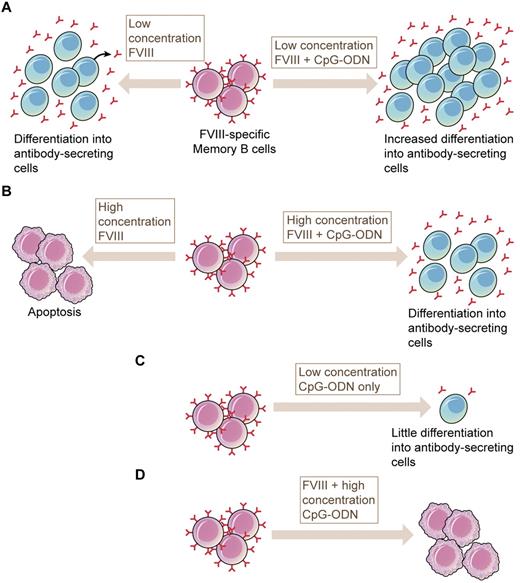In this issue of Blood, Allacher and colleagues elegantly show that triggering of the innate immune system modulates the restimulation of preexisting FVIII-specific memory B cells in a murine model for inhibitor development in hemophilia A.1
The development of inhibitory antibodies in patients suffering from the X-linked bleeding disorder hemophilia A provides a major side-effect of factor VIII (FVIII) replacement therapy. Pioneering studies by Hans Brackmann in Bonn showed that tolerance to FVIII can be restored by frequent administration of high dosages of FVIII, so-called immune tolerance induction (ITI) therapy.2,3 Despite its high overall success rate, the mechanisms underlying successful ITI have remained obscure for a long time. An earlier landmark study from the Reipert group revealed that high dosages of FVIII prevent the restimulation of FVIII-specific memory B cells in hemophilic mice.4 This observation suggested that administration of high dosages of FVIII eliminates FVIII-specific memory B cells thereby contributing to the decline in FVIII inhibitor levels during ITI. In the present report, the same group explores whether triggering of pattern recognition receptors of the innate immune system modulate the restimulation of FVIII-specific memory B cells. Triggering of Toll-like receptors TLR7 and TLR9 effectively promoted the restimulation of FVIII-specific memory B cells at a low concentration of FVIII (see figure, panel A). Triggering of TLR7 and TLR9 also abolished the inhibition of memory responses induced by high concentrations of FVIII (see figure, panel B).
In vitro restimulation of FVIII-specific memory B cells in the presence of FVIII and CpG-ODN. (A) In vitro restimulation of FVIII-specific memory B cells at low concentrations of FVIII results in differentiation into antibody-secreting cells (ASC). Low concentrations of FVIII combined with TLR9 ligand CpG-ODN results in an increased number of ASCs. (B) High concentrations of FVIII induce apoptosis of FVIII-specific memory B cells. CpG-ODN is able to overcome the apoptotic effect induced by high-concentration doses of FVIII. (C) Low concentrations of CpG-ODN alone induce no or very limited numbers of ASCs. (D) High concentrations of CpG-ODN severely reduce the FVIII-induced formation of ASCs. (Professional illustration by Kenneth X. Probst.)
In vitro restimulation of FVIII-specific memory B cells in the presence of FVIII and CpG-ODN. (A) In vitro restimulation of FVIII-specific memory B cells at low concentrations of FVIII results in differentiation into antibody-secreting cells (ASC). Low concentrations of FVIII combined with TLR9 ligand CpG-ODN results in an increased number of ASCs. (B) High concentrations of FVIII induce apoptosis of FVIII-specific memory B cells. CpG-ODN is able to overcome the apoptotic effect induced by high-concentration doses of FVIII. (C) Low concentrations of CpG-ODN alone induce no or very limited numbers of ASCs. (D) High concentrations of CpG-ODN severely reduce the FVIII-induced formation of ASCs. (Professional illustration by Kenneth X. Probst.)
TLR7 and TLR9 are triggered by viral nucleic acids and the observed effects suggest that infections or vaccinations may potentially activate FVIII-specific memory B cells in patients with hemophilia A. Importantly, the observed effects are strictly dependent on the presence of FVIII. In the absence of FVIII, TLR9 triggering does not result in stimulation of FVIII-specific memory B cells (see figure, panel C). It is important to note that in the human model systems, TLR agonists as well as bystander T-cell help have been shown to result in polyclonal activation of human memory B cells independent of the presence of specific antigen.5 Based on these findings, it was hypothesized that TLR9 agonists or bystander T cells can drive the activation of human memory B cells resulting in their self-renewal and differentiation into antibody-secreting cells.5 However, findings in several murine models strongly suggest that—at least in mice—in vivo restimulation is strictly dependent on the presence of antigen.6,7 It remains difficult to extrapolate the results obtained by Allacher and coworkers to the human immune system. Low frequencies of circulating FVIII-specific memory B cells have been found in hemophilia A patients with inhibitors.8,9 Presently, no data are available with respect to the impact of viral infections or vaccinations on the differentiation or proliferation of FVIII-specific human memory B cells. Therefore, it is currently not clear whether natural infections can enhance or reduce anamnestic antibody responses in patients with hemophilia A.
Unexpectedly, Allacher and coworkers show that high concentrations of the TLR9 agonist CpG–oligodeoxynucleotide (CpG-ODN) completely abolish the FVIII-driven restimulation of memory B cells (see figure, panel D). The authors speculate that modulation of dendritic cell function by high dosages of CpG-ODN induces regulatory CD4+ T cells that prevent the activation of CD4+ T cells required for restimulation of FVIII-specific memory B cells. The signaling pathways underlying the modulating effect of high dosages of CpG-ODN have not yet been clarified. Future studies in this area may help to generate novel strategies for inducing antigen-specific B-cell apoptosis. Ultimately, this may result in improved treatment regimens for restoring tolerance in hemophilia A patients with inhibitors.
Conflict-of-interest disclosure: The authors declare no competing financial interests. ■


This feature is available to Subscribers Only
Sign In or Create an Account Close Modal